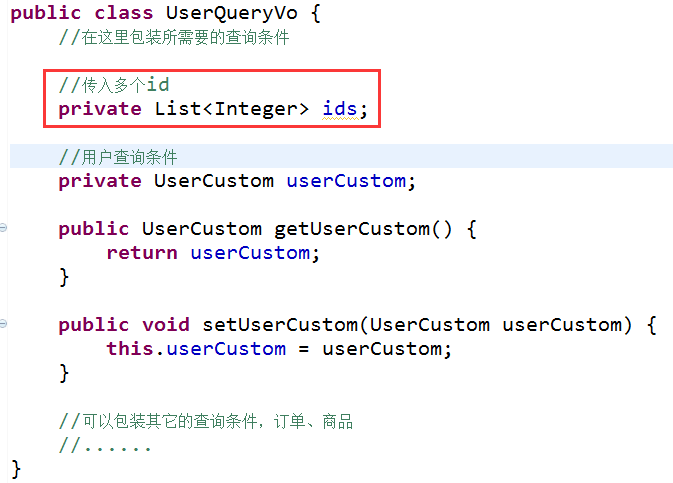For reprinting, please indicate the source: http://www.cnblogs.com/Joanna-Yan/p/6908763.html
I mentioned earlier. Spring+Spring MVC+MyBatis Deep Learning and Building (IV):MyBatis Input and Output Mapping
mybatis core: flexible operation of SQL statements, judgment through expressions, flexible splicing and assembly of sql.
mybatis provides various tag methods to realize dynamic splicing sql.
1. if&where
1.2 Demand
Dynamic sql is used to define the two states: the comprehensive query list of user information and the total number of query lists of user information.
The query conditions are judged, if the input parameters are not empty, the query conditions are mosaic.
1.3 mapper.xml
<select id="findUserList" parameterType="joanna.yan.mybatis.entity.UserQueryVo" resultType="joanna.yan.mybatis.entity.UserCustom"> SELECT * FROM USER <!--where The first of the conditions can be automatically removed and --> <where> <if test="userCustom!=null"> <if test="userCustom.sex!=null and userCustom.sex!=''"> and user.sex=#{userCustom.sex} </if> <if test="userCustom.username!=null and userCustom.username!=''"> and user.username LIKE '%${userCustom.username}%' </if> </if> </where> </select>
<select id="findUserCount" parameterType="joanna.yan.mybatis.entity.UserQueryVo" resultType="int"> SELECT count(*) FROM USER <!--where The first of the conditions can be automatically removed and --> <where> <if test="userCustom!=null"> <if test="userCustom.sex!=null and userCustom.sex!=''"> and user.sex=#{userCustom.sex} </if> <if test="userCustom.username!=null and userCustom.username!=''"> and user.username LIKE '%${userCustom.username}%' </if> </if> </where> </select>
1.4 Test Code
@Test public void findUserListTest() throws Exception{ SqlSession sqlSession=sqlSessionFactory.openSession(); UserMapper userMapper=sqlSession.getMapper(UserMapper.class); //Create wrapper objects and set query conditions UserQueryVo userQueryVo=new UserQueryVo(); UserCustom userCustom=new UserCustom(); //Because dynamic is used here sql,If a value is not set, the condition will not be spliced together sql in // userCustom.setSex("1"); userCustom.setUsername("Zhang Sanfeng"); userQueryVo.setUserCustom(userCustom); List<UserCustom> list=userMapper.findUserList(userQueryVo); System.out.println(list); }
Printed sql: If the value of sex is not set, the condition will not be spliced into SQL

2.sql fragment
2.1 Demand
The dynamic sql judgment code block implemented above is extracted to form an sql fragment. sql fragments can be referenced in other states. It is convenient for programmers to develop.
2.2 Define sql fragments
<! -- Define sql fragments
Id: Unique identification of SQL fragments
Experience: 1. Define sql fragments based on single tables, so that the sql fragments are highly reusable.
2. Do not include where in the sql fragment
-->
<sql id="query_user_where">
<if test="userCustom!=null">
<if test="userCustom.sex!=null and userCustom.sex!=''">
and user.sex=#{userCustom.sex}
</if>
<if test="userCustom.username!=null and userCustom.username!=''">
and user.username LIKE '%${userCustom.username}%'
</if>
</if>
</sql>
2.3 Reference to sql fragments
Refer to sql fragment in defining state in mapper.xml:
<select id="findUserList" parameterType="joanna.yan.mybatis.entity.UserQueryVo" resultType="joanna.yan.mybatis.entity.UserCustom"> SELECT * FROM USER <!--where The first of the conditions can be automatically removed and --> <where> <!--Quote sql Fragmental id,If refid Designated id Not in this book mapper In the file, you need to add it in front namespace --> <include refid="query_user_where"></include> <!--There are other references here. sql fragment --> </where> </select>
<select id="findUserCount" parameterType="joanna.yan.mybatis.entity.UserQueryVo" resultType="int"> SELECT count(*) FROM USER <!--where The first of the conditions can be automatically removed and --> <where> <!--Quote sql Fragmental id,If refid Designated id Not in this book mapper In the file, you need to add it in front namespace --> <include refid="query_user_where"></include> <!--There are other references here. sql fragment --> </where> </select>
3. foreach
Pass an array or List to sql, and mybatis uses foreach parsing.
3.1 Demand
Multiple id input queries are added to the statement of the user query list and the total number of queries.
The sql statement is as follows, in two ways:
SELECT * FROM USER WHERE id=1 OR id=10 OR id=16
SELECT * FROM USER WHERE id IN(1,10,16)
3.2 Add List < Integer > IDs to the input parameter type to pass in multiple IDS

3.3 Modify mapper.xml
WHERE id=1 OR id=10 OR id=16
In the previous query condition, the query condition was defined as an sql fragment. Now we need to modify the sql fragment.
<! -- Define sql fragments
Id: Unique identification of SQL fragments
Experience: 1. Define sql fragments based on single tables, so that the sql fragments are highly reusable.
2. Do not include where in the sql fragment
-->
<sql id="query_user_where">
<if test="userCustom!=null">
<if test="userCustom.sex!=null and userCustom.sex!=''">
and user.sex=#{userCustom.sex}
</if>
<if test="userCustom.username!=null and userCustom.username!=''">
and user.username LIKE '%${userCustom.username}%'
</if>
<if test="ids!=null">
<! -- Traverse the incoming ids using foreach
Collection: Specifies the collection properties in the input object
item: The name of the object generated by each traversal
open: Strings spliced at the beginning of traversal
close: A string spliced at the end of traversal
separator: Strings that need to be spliced between two objects traversed
-->
<! - To achieve the following sql splicing:
AND (id=1 OR id=10 OR id=16)
-->
<foreach collection="ids" item="user_id" open="AND (" close=")" separator="or">
<! - Strings that need splicing for each traversal - >
id=#{user_id}
</foreach>
</if>
</if>
</sql>
3.4 Test Code
@Test public void findUserListTest() throws Exception{ SqlSession sqlSession=sqlSessionFactory.openSession(); UserMapper userMapper=sqlSession.getMapper(UserMapper.class); //Create wrapper objects and set query conditions UserQueryVo userQueryVo=new UserQueryVo(); UserCustom userCustom=new UserCustom(); //Because dynamic is used here sql,If a value is not set, the condition will not be spliced together sql in // userCustom.setSex("1"); userCustom.setUsername("Xiao Ming"); //Input multiple id List<Integer> ids=new ArrayList<>(); ids.add(1); ids.add(10); ids.add(16); userQueryVo.setIds(ids); userQueryVo.setUserCustom(userCustom); List<UserCustom> list=userMapper.findUserList(userQueryVo); System.out.println(list); }
If this article is helpful to you, please give me a reward by Wechat.~
